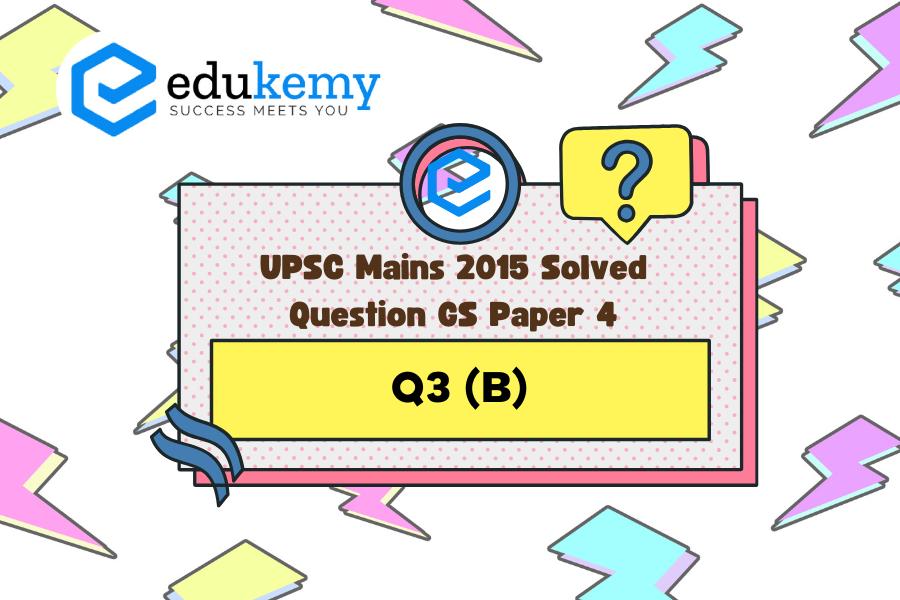The Union Public Service Commission (UPSC) is the apex recruiting body in India responsible for selecting candidates for various prestigious civil services positions. In 2015, the General Studies Paper 4, also known as the Ethics, Integrity, and Aptitude paper, presented candidates with a challenging array of questions aimed at evaluating their ethical and moral reasoning, decision-making abilities, and overall aptitude. This paper, a critical component of the UPSC examination, tests not only the knowledge but also the character and judgment of aspiring civil servants. Let’s delve into the solved questions of the UPSC 2015 GS 4 paper to gain insight into the rigorous standards expected of future administrators and leaders in India.
Contents
Q3. (b) How do the virtues of trustworthiness and fortitude get manifested in public service? Explain with examples. (150 Words, 10 Marks)
Tags: Public/Civil service values and Ethics in Public administration: Status and problems; ethical concerns and dilemmas in government and private institutions; laws, rules, regulations and conscience as sources of ethical guidance; accountability and ethical governance; strengthening of ethical and moral values in governance; ethical issues in international relations and funding; corporate governance.
Decoding the Question:
- In the Intro, try to introduce the concept of trustworthiness and fortitude.
- In Body,
- Ways in which virtues of trustworthiness and fortitude get manifested in public service.
- In Conclusion, try to give reasons for the inclusion of trustworthiness and fortitude in service.
Answer:
Public service is a broad framework, which aims at providing services to people with the advancement of the greater common good. Resources have to be managed on behalf of the community, hence the public administrators must display certain attributes while working for public interest. Trustworthiness and fortitude are the two main attributes.
People with trustworthiness are those whose words match their deeds and whose behaviors mirror their values. Their honesty and ethics can be trusted unconditionally. They honor commitments. They are dependable. Trustworthiness of the servant can create an atmosphere of integrity and character. Fortitude is the virtue that moderates the emotions of fear and daring following the right reason. There are times when the civil servants are expected to manage their fears. It is seen that courage during difficult situations is something considered an essential attribute of civil services.
The virtues of trustworthiness and fortitude can get manifested in public service by:
- Upholding Principles of Fidelity: The government is all about relationships. Losing trust means everything is lost. Fulfilling the commitments and being responsible in interpersonal relationships builds trust in the team. This trust is reflected when commitments are being fulfilled.
- Transparency and Participative Approach: This can develop credibility and trust among people. For Example: The Panchayat system enhances trust and teamwork between people and administration.
- Rule of Law: There may be challenging environments when it becomes hard to uphold the law. It requires moral strength to uphold the Rule of Law and to work for realizing the values enshrined in the Constitution. Example: Not taking into account the inappropriate influence by the political boss which can undermine the public interest.
- Commitment to Public Service: There are many lures to make personal gains at the cost of public interest. It necessitates moral fortitude to overcome these temptations and remain committed to the service of the people.
Civil servants are required to display courage against illegal pressures whether it is from political executives or from their own seniors. Trustworthiness and Fortitude should be foundational values of a civil servant, which help him in discharging his duties effectively. By creating this atmosphere of trust, the administration helps the public understand that they are working with their best interests in mind. When public servants work with integrity and there is probity in governance, it helps foster trust with society and ultimately leads to good governance.
In case you still have your doubts, contact us on 9811333901.
For UPSC Prelims Resources, Click here
For Daily Updates and Study Material:
Join our Telegram Channel – Edukemy for IAS
- 1. Learn through Videos – here
- 2. Be Exam Ready by Practicing Daily MCQs – here
- 3. Daily Newsletter – Get all your Current Affairs Covered – here
- 4. Mains Answer Writing Practice – here


